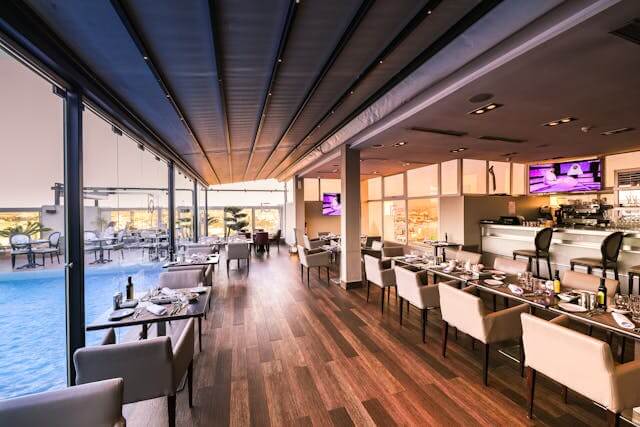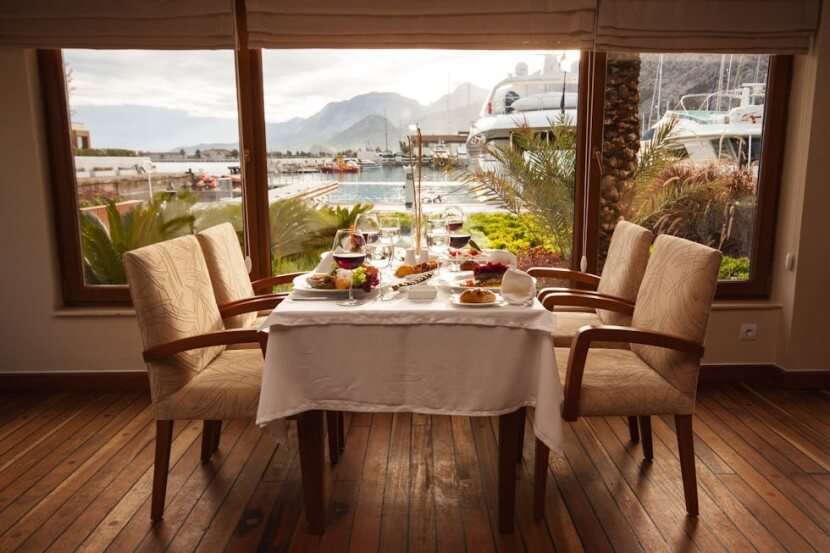Table of Contents
Essential German Café and Restaurant Words in German
Here, you’ll find a selection of key German vocabulary related to cafés and restaurants. The terms are sorted alphabetically by the German words (without articles).
- abholen (to pick up – takeaway)
- das Abendessen (the dinner)
- bestellen (to order)
- das Besteck (the cutlery)
- das Brötchen (the bread roll)
- die Bedienung (the service)
- die Bestellung (the order)
- das Frühstück (the breakfast)
- das Gericht (the dish – meal)
- das Getränk (the drink)
- die Gabel (the fork)
- der Kaffee (the coffee)
- der Kellner (the waiter)
- die Kellnerin (the waitress)
- der Kuchen (the cake)
- der Löffel (the spoon)
- das Messer (the knife)
- das Mittagessen (the lunch)
- die Nachspeise (the dessert)
- die Quittung (the receipt)
- die Rechnung (the bill)
- reservieren (to reserve)
- die Speisekarte (the menu)
- der Tee (the tea)
- der Tisch (the table)
- das Trinkgeld (the tip)
- trinken (to drink)
- die Vorspeise (the appetizer)
- vegetarisch (vegetarian)
- das Wasser (the water)
- warten (to wait)
- zahlen (to pay)
Dining Phrases and Example Sentences

To help you practice these vocabulary words in real-life situations, here are some sample sentences:
| German Word | German Example Sentence | English Translation |
|---|---|---|
| abholen | Ich werde das Essen abholen. | I will pick up the food. |
| das Abendessen | Wir genießen ein gemütliches Abendessen. | We are enjoying a cozy dinner. |
| bestellen | Wir möchten zwei Pizzen bestellen. | We would like to order two pizzas. |
| das Besteck | Das Besteck liegt neben dem Teller. | The cutlery is next to the plate. |
| das Brötchen | Zum Frühstück esse ich ein Brötchen. | For breakfast, I eat a bread roll. |
| die Bedienung | Die Bedienung ist heute sehr freundlich. | The service is very friendly today. |
| die Bestellung | Unsere Bestellung ist noch nicht angekommen. | Our order hasn’t arrived yet. |
| das Frühstück | Das Frühstück wird von 7 bis 10 Uhr serviert. | Breakfast is served from 7 to 10 am. |
| das Gericht | Das heutige Spezialgericht ist Lachs. | Today’s special dish is salmon. |
| das Getränk | Welches Getränk möchten Sie bestellen? | Which drink would you like to order? |
| die Gabel | Ich habe meine Gabel fallen gelassen. | I dropped my fork. |
| der Kaffee | Ich hätte gern einen schwarzen Kaffee. | I would like a black coffee. |
| der Kellner | Der Kellner bringt uns das Essen. | The waiter is bringing us the food. |
| die Kellnerin | Die Kellnerin nimmt unsere Bestellung auf. | The waitress is taking our order. |
| der Kuchen | Der Kuchen schmeckt sehr gut. | The cake tastes very good. |
| der Löffel | Ich brauche einen Löffel für die Suppe. | I need a spoon for the soup. |
| das Messer | Das Messer ist nicht scharf genug. | The knife is not sharp enough. |
| das Mittagessen | Wir treffen uns zum Mittagessen. | We are meeting for lunch. |
| die Nachspeise | Möchten Sie eine Nachspeise bestellen? | Would you like to order a dessert? |
| die Quittung | Können Sie mir bitte die Quittung geben? | Can you please give me the receipt? |
| die Rechnung | Können wir bitte die Rechnung haben? | Could we have the bill, please? |
| reservieren | Wir möchten einen Tisch für vier Personen reservieren. | We would like to reserve a table for four people. |
| die Speisekarte | Könnten wir bitte die Speisekarte haben? | Could we please have the menu? |
| der Tee | Ich trinke gerne grünen Tee. | I like to drink green tea. |
| der Tisch | Unser Tisch ist am Fenster. | Our table is by the window. |
| das Trinkgeld | Wir geben immer ein Trinkgeld. | We always leave a tip. |
| trinken | Was möchten Sie trinken? | What would you like to drink? |
| die Vorspeise | Als Vorspeise nehme ich die Suppe. | For the appetizer, I’ll have the soup. |
| vegetarisch | Haben Sie vegetarische Gerichte? | Do you have vegetarian dishes? |
| das Wasser | Ich hätte gern ein Glas Wasser, bitte. | I would like a glass of water, please. |
| warten | Wir müssen auf einen freien Tisch warten. | We have to wait for a free table. |
| zahlen | Wir möchten jetzt zahlen. | We would like to pay now. |
Free Café and Restaurant Vocabulary Quiz
Ready to review what you’ve learned?
Take our free café and restaurant vocabulary quiz to check your understanding. The quiz includes multiple-choice questions based on the words listed in this article. It’s ideal for A1–B1 learners who want to reinforce new vocabulary in a fun, interactive way.
Start the quiz now and boost your German vocabulary step by step.
Learn with a Short Story
You can read our short story and see the vocabulary in action!
Conclusion
Building up your German vocabulary for cafés and restaurants can really elevate your dining experiences in German-speaking regions. With the right words, you’ll feel more confident interacting with staff, reading menus, and soaking up the local food culture. Practicing these terms regularly will boost your fluency and make each visit even more enjoyable.
Keep practicing, and feel free to come back to this guide anytime you need a quick refresher. Viel Spaß beim Lernen! (Enjoy your learning!)
Frequently Asked Questions
Why is it useful to learn German vocabulary for cafés and restaurants?
It helps you handle real-life situations like ordering food, asking for the bill, or making a reservation. You can interact naturally in cafés and restaurants in German-speaking countries.
Is this vocabulary list suitable for beginners?
Yes. The vocabulary is written for A1 to B1 learners. It includes essential nouns, verbs, and phrases you can use in everyday dining situations.
How can I practice café and restaurant vocabulary?
You can take our free quiz, read the short story linked in this article, or make your own example sentences. Role-play with a friend or teacher also helps.
Are these words used in all German-speaking countries?
Yes. The terms are understood in Germany, Austria, and Switzerland. Some regional variations exist, but these are standard and widely recognized.
Where can I find more German vocabulary articles like this?
Visit our vocabulary overview page for more themed vocabulary lists and reading practice.
Do you offer quizzes for café and restaurant vocabulary?
Yes! Try our free café and restaurant quiz. It’s a fun way to test your knowledge.

